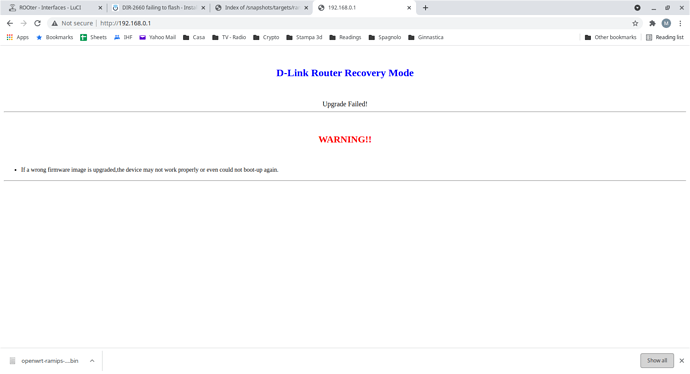Hello,
I have been trying (and failing) to flash dlink_dir-2660-a1-squashfs-factory.bin on a DIR-2660 A1 device, using the D-Link recovery web UI (and curl - other browsers had no success). The behavior I notice is:
[1] Router powers on (with the reset button pressed) and gets in its recovery UI - the power led is blinking and I can open its page in 192.168.0.1.
[2] I send the FW using curl (tried with a couple of snapshots from the last few days and a couple of "stock" versions from D-Link)
[3] curl gets a reply from the router (that the FW is successfully uploaded and is getting flashed, with a js script counting to 100%) and the power led remains constant on
[4] In the case of the "stock" FW from D-Link, the router resets after a few seconds and eventually boots with the newly flashed FW. (flashing is successful)
[5] In the case of the factory openwrt image, the router stays with the power led on for a couple of seconds and then the led starts flashing again (in the same way as in the recovery GUI). At this stage the router seems totally inaccessible in any way and it stays there forever until manually powercycled. When powercycled it boots to the FW it had earlier.
To me, this behavior seems like the openwrt factory.bin getting uploaded, but then rejected for some reason by the router. I wonder if there is something obvious that I am missing (or doing very wrong) or if there's something else that blocks the flashing (could there be a change in the way the FW is verified by the router, resulting in rejecting openwrt?) I also wonder what other options I'd have in order to get some idea of what's happening (preferably without dismantling the router).
P.S.1: The obvious checksum test of the factory.bin to confirm that I don't have a corrupted download is successful - I have the correct binary.
